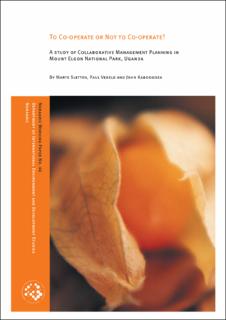To co-operate or not to co-operate? A study of Collaborative Management Planning in Mount Elgon National Park, Uganda
Working paper
Permanent lenke
https://hdl.handle.net/11250/2680560Utgivelsesdato
2008-11Metadata
Vis full innførselSamlinger
Sammendrag
This paper addresses challenges of collaborative resource management around Mt. Elgon National Park in Uganda, investigated through household and community level surveys conducted in 2002. In an initial situation of strong conflicts, due to eviction, land deprivation and restriction in resource access through the conversion from a forest reserve to a national park, the paper analyses first of all how the processes behind establishing the participatory venture have been, to what extent people have felt activities as legitimate and inclusive using an implementation process perspective. This includes a discussion of to what extent the participation here can be seen as slow processes of social change involving participation as a goal in itself, and as part of efforts for a rights-based development. The paper also makes an analysis of the structure of the agreement in itself, and what pitfalls it may contain for the future implementation and establishment as conducive rules for a long enduring social institution.
It is found that people do participate to some extent and that their perceptions towards the Park and Park Staff have improved after the introduction of Resource Use Agreements, which assigns rights and duties to people. The participation is still found to be very controlled and contingent, a rather functional and instrumental approach, with Uganda Wildlife Authority/ IUCN controlling both process and the structure and form of the agreements. Participation is clearly a means, not seen or meant as a right or as an aim in its own right. There are both formal and informal asymmetric power relations, where UWA at any time can withdraw from the agreement. The analysis also reveals a lack of understanding for local heterogeneity, where conflicts within and between local communities are not well addressed. Much of the conflicts are also left and partly actively transferred to the local RUCs, which neither have the resources, nor the mandate to handle these.
It is recommended first of all to rearrange particular formal structures and processes constraining present management and delivery. One should also improve training for UWA staff on handling socio-cultural and local participation issues and secure rights of access better for marginal local people. One also suggests to introduce an external and independent arbitration function between UWA and to support network of RUCs to improve the existing asymmetric power relationships. One should form processes to negotiate and settle underlying, and far more serious issues of land tenure rights around the park.
